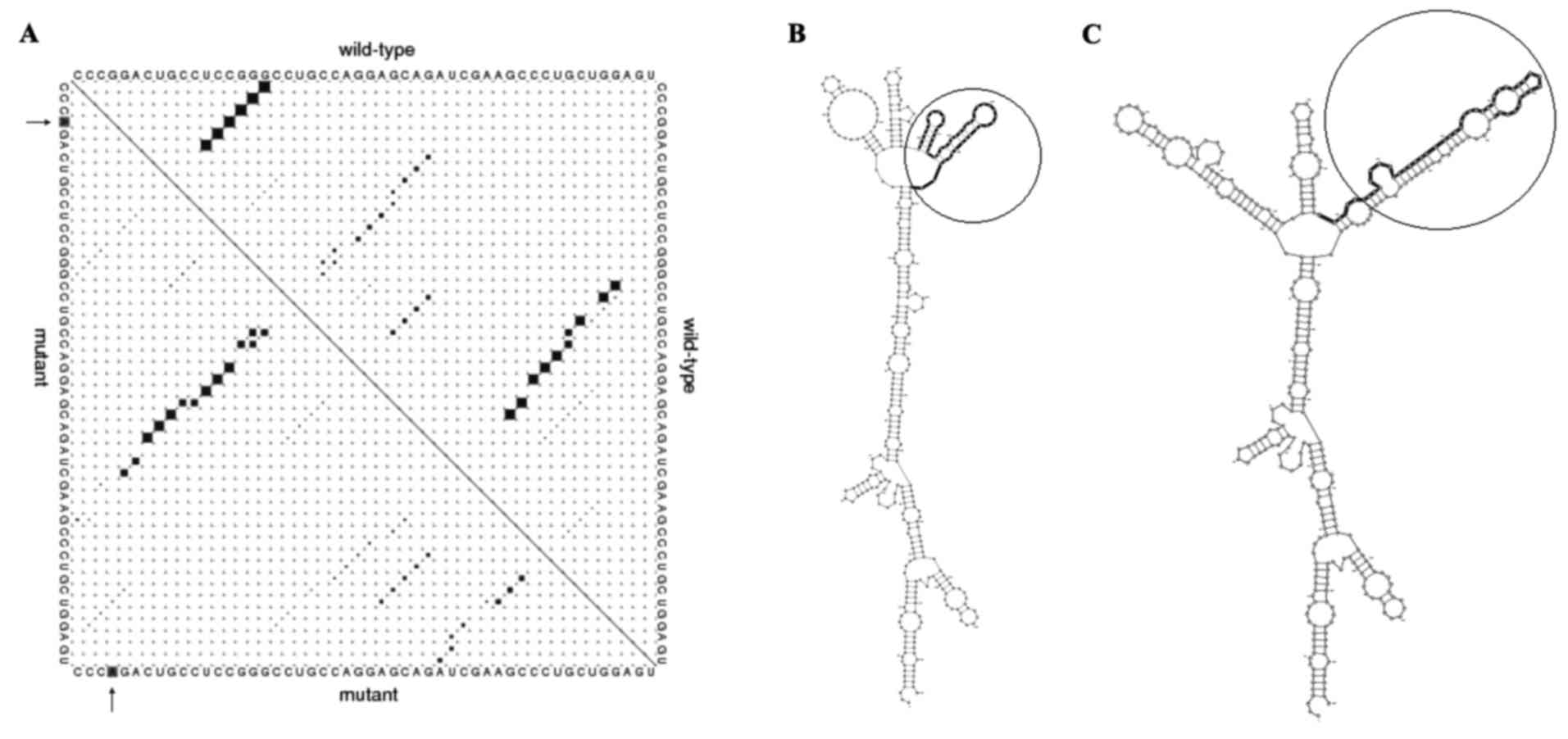|
1
|
Stewart EA, Friedman AJ, Peck K and Nowak
RA: Relative overexpression of collagen type I and collagen type
III messenger ribonucleic acids by uterine leiomyomas during the
proliferative phase of the menstrual cycle. J Clin Endocrinol
Metab. 79:900–906. 1994. View Article : Google Scholar : PubMed/NCBI
|
|
2
|
Barbarisi A, Petillo O, Di Lieto A, Melone
MA, Margarucci S, Cannas M and Peluso G: 17-beta estradiol elicits
an autocrine leiomyoma cell proliferation: Evidence for a
stimulation of protein kinase-dependent pathway. J Cell Physiol.
186:414–424. 2001. View Article : Google Scholar : PubMed/NCBI
|
|
3
|
Jeon YT, Kim JW, Park NH, Song YS, Kang SB
and Lee HP: DNA repair gene XRCC1 Arg399Gln polymorphism is
associated with increased risk of uterine leiomyoma. Hum Reprod.
20:1586–1589. 2005. View Article : Google Scholar : PubMed/NCBI
|
|
4
|
Gittenberger-de Groot AC, DeRuiter MC,
Bergwerff M and Poelmann RE: Smooth muscle cell origin and its
relation to heterogeneity in development and disease. Arterioscler
Thromb Vasc Biol. 19:1589–1594. 1999. View Article : Google Scholar
|
|
5
|
Medikare V, Kandukuri LR, Ananthapur V,
Deenadayal M and Nallari P: The genetic bases of uterine fibroids;
a review. J Reprod Infertil. 12:181–191. 2011.PubMed/NCBI
|
|
6
|
Vikhlyaeva EM, Khodzhaeva ZS and
Fantschenko ND: Familial predisposition to uterine leiomyomas. Int
J Gynaecol Obstet. 51:127–131. 1995. View Article : Google Scholar : PubMed/NCBI
|
|
7
|
Galderisi U, Jori FP and Giordano A: Cell
cycle regulation and neural differentiation. Oncogene.
22:5208–5219. 2003. View Article : Google Scholar : PubMed/NCBI
|
|
8
|
Sherr CJ: Cancer cell cycles. Science.
274:1672–1677. 1996. View Article : Google Scholar : PubMed/NCBI
|
|
9
|
Shevra CR, Ghosh A and Kumar M: Cyclin D1
and Ki-67 expression in normal, hyperplastic and neoplastic
endometrium. J Postgrad Med. 61:15–20. 2015. View Article : Google Scholar : PubMed/NCBI
|
|
10
|
Bae DS, Cho SB, Kim YJ, Whang JD, Song SY,
Park CS, Kim DS and Lee JH: Aberrant expression of cyclin D1 is
associated with poor prognosis in early stage cervical cancer of
the uterus. Gynecol Oncol. 81:341–347. 2001. View Article : Google Scholar : PubMed/NCBI
|
|
11
|
Ayed A and Adesina A: Prognostic
significance of cyclin D1 expression in resected stage I, II
non-small cell lung cancer in Arabs. Interact Cardiovasc Thorac
Surg. 5:47–51. 2006. View Article : Google Scholar : PubMed/NCBI
|
|
12
|
Abramson VG, Troxel AB, Feldman M, Mies C,
Wang Y, Sherman L, McNally S, Diehl A and Demichele A: Cyclin D1b
in human breast carcinoma and coexpression with cyclin D1a is
associated with poor outcome. Anticancer Res. 30:1279–1285.
2010.PubMed/NCBI
|
|
13
|
Betticher DC, Thatcher N, Altermatt HJ,
Hoban P, Ryder WD and Heighway J: Alternate splicing produces a
novel cyclin D1 transcript. Oncogene. 11:1005–1011. 1995.PubMed/NCBI
|
|
14
|
Han SS, No JH, Jeon YT, Kim JW, Park NH,
Song YS, Kang SB and Lee HP: Association of cyclin D1 G870A
polymorphism with uterine leiomyoma in women whose body mass index
values are above 25 kg/m2. Hum Reprod. 23:525–529. 2008. View Article : Google Scholar : PubMed/NCBI
|
|
15
|
Sabarinathan R, Tafer H, Seemann SE,
Hofacker IL, Stadler PF and Gorodkin J: The RNAsnp web server:
Predicting SNP effects on local RNA secondary structure. Nucleic
Acids Res. 41:W475–W479. 2013. View Article : Google Scholar : PubMed/NCBI
|
|
16
|
Mallya SM and Arnold A: Cyclin D1 in
parathyroid disease. Front Biosci. 5:D367–D371. 2000. View Article : Google Scholar : PubMed/NCBI
|
|
17
|
Catalano S, Giordano C, Rizza P, Gu G,
Barone I, Bonofiglio D, Giordano F, Malivindi R, Gaccione D,
Lanzino M, et al: Evidence that leptin through STAT and CREB
signaling enhances cyclin D1 expression and promotes human
endometrial cancer proliferation. J Cell Physiol. 218:490–500.
2009. View Article : Google Scholar : PubMed/NCBI
|
|
18
|
Li HY, Xu Q, Zhu T, Zhou JH, Deng DR, Wang
SX, Lu YP and Ma D: Expression and clinical significance of Pin1
and Cyclin D1 in cervical cancer cell lines and cervical epithelial
tissues. Ai Zheng. 25:367–372. 2006.(In Chinese). PubMed/NCBI
|
|
19
|
Goumenou AG, Matalliotakis IM, Tzardi M,
Fragouli IG, Mahutte NG and Arici A: p16, retinoblastoma (pRb), and
cyclin D1 protein expression in human endometriotic and adenomyotic
lesions. Fertil Steril 85 (Suppl 1). 1204–1207. 2006. View Article : Google Scholar
|
|
20
|
Kovács KA, Oszter A, Göcze PM, Környei JL
and Szabó I: Comparative analysis of cyclin D1 and oestrogen
receptor (alpha and beta) levels in human leiomyoma and adjacent
myometrium. Mol Hum Reprod. 7:1085–1091. 2001. View Article : Google Scholar : PubMed/NCBI
|
|
21
|
Velez AM Abreu and Howard MS:
Tumor-suppressor Genes, Cell Cycle Regulatory Checkpoints, and the
Skin. N Am J Med Sci. 7:176–188. 2015. View Article : Google Scholar : PubMed/NCBI
|
|
22
|
Dai X, Zhang X, Wang B, Wang C, Jiang J
and Wu C: Association Between Polymorphism rs678653 in Human Cyclin
D1 Gene (CCND1) and Susceptibility to Cancer: A Meta-Analysis. Med
Sci Monit. 22:863–874. 2016. View Article : Google Scholar : PubMed/NCBI
|
|
23
|
Yang M, Zhu H, Hu T, Liu S and Wang H:
Association of CCND1 gene polymorphism with cervical cancer
susceptibility in Caucasian population: A meta-analysis. Int J Clin
Exp Med. 8:12983–12988. 2015.PubMed/NCBI
|
|
24
|
Shen LX, Basilion JP and Stanton VP Jr:
Single-nucleotide polymorphisms can cause different structural
folds of mRNA. Proc Natl Acad Sci USA. 96:7871–7876. 1999.
View Article : Google Scholar : PubMed/NCBI
|















